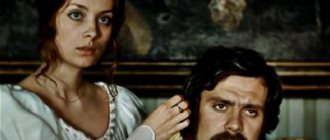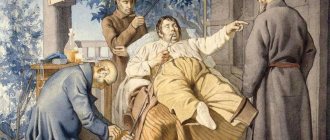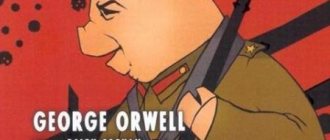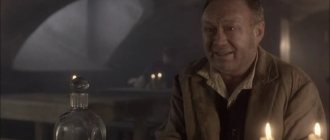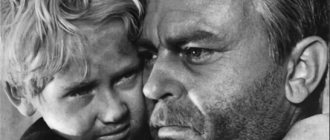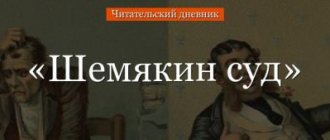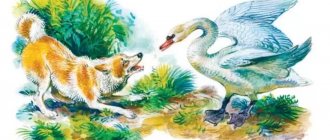- Summary
- Abramov
- What do horses cry about?
Every time the narrator finds himself in the meadow, he remembers his childhood and watches the horses grazing tied to a stake. He often took a piece of bread with him to feed his horses. Even if it was not possible to grab bread, he still did not pass by the horses - he approached them, patted them in a friendly manner, encouraged them with a word or ruffled them on the lips, after which the horse smell that he liked remained on his hands.
On the one hand, the horses made the narrator happy; on the other hand, he felt pity for them or even guilt towards the horses.
The groom, being often drunk, did not take good care of the horses. He might not appear for several days, then the horses would run out of grass, they would be thirsty and suffer from midges.
The villagers also fed the horses.
One day in the meadow the narrator saw his favorite horse, named Ryzhukha. She was a small and inconspicuous horse, hardy and accustomed to northern conditions. The exhausting work disfigured her, but Ryzhukha remained cheerful and cheerful.
At the sight of the narrator, she became joyful, but this time she did not even look at the bread. The narrator noticed tears in her eyes and asked her what was wrong with her? It was as if he heard the horse’s words that once upon a time horses were protected and spared (according to the old horse Zabava), and the other horses only laughed at these thoughts when Ryzhukha shared with them.
Redhead and the other horses ask the narrator to reveal the truth. The man confirmed these words: before, the horses were given the last bread, they were fed well, the horse returning from work was greeted by the whole family with gratitude, the horses were cleaned and washed every day. The horse was the stronghold of the peasants.
The peasant boy's first toy was a horse made of wood. In the interior of the house you can see a horse on a spinning wheel on the roof. The mother sang songs about the sivka-burka to her children. A horse's shoe - a symbol of happiness - used to hang over every threshold.
Not so anymore. For example, Karko, who served as a logging horse during the war, was sent to the cauldron on Victory Day.
After the narrator left the meadow, he felt as if he had deceived the horses and now he would never be able to be as sincere with Redhead as before. The narrator was attacked by a horse's melancholy. He felt like an outdated animal like horses.
The story teaches how to treat animals with care. Using the example of the narrator, you can learn not only to treat horses well, but also to be sincere and humane.
You can use this text for a reader's diary
A very brief retelling of the story “What Horses Cry About.”
The narrator tells how, during one of his walks around the village, he looked into a pasture where collective farm horses were grazing. The groom Mikolka, to whose care the animals were entrusted, practically did not look after them: they were always hungry and thirsty. The collective farm horses evoked sad feelings. The narrator, feeling sorry for the animals, fed them with bread.
Among the horses he had a favorite - the “hardy and unpretentious” Ryzhukha (the second name she was given on the collective farm was Klara). But the narrator called her Redhead - in a simple way, with love.
The redhead, contrary to her custom, did not greet him, was not at all happy and did not take the treat. Looking closer, the narrator noticed tears in the horse's eyes. She cried. And in response to his persistent questions, she said that a dispute ensued between the horses: was there a time when they were treated kindly and carefully, valued, cherished, and given the last piece of bread? She learned about this from the old mare Zabava. And the other horses didn’t believe her and shouted that she was lying about the horses’ happy times.
And the narrator remembered: yes, there were such times. Before collective farms appeared, each owner took care of his hobby as closely as he could. And on the collective farm, everyone came running to look after their horse, reproaching the groom for not providing water and food on time, for poor care. Even fights broke out.
But as time passed, equipment appeared on the collective farms, and horses—common, “nobody’s”—became no longer particularly needed. And they were entrusted to the supervision of some drunkard groom, driven to hard work, without sparing.
But the narrator could not honestly tell the horses about all this. He tried to answer cheerfully and carelessly, to turn everything into a joke. Having hastily provided Ryzhukha and others with bread, he left. Melancholy fell upon the narrator, “heavy horse melancholy.” He deceived Ryzhukha and understood that there would be no more sincerity in his relationship with the mare. And he began to seem to himself the same “ridiculous, outdated creature” as the goners grazing on a dry, gnawed meadow.
Summary
- The author, walking through the village, took bread with him, went to the meadow to treat the horses, he loved their beauty, he could admire them for hours.
- The groom was always drunk, he pinned the horses' reins to a stake, and they had already eaten all the grass down to the turf, so they spared the horses and often fed them.
- The author approached his favorite Ryzhukha, but she cried large tears, complaining that they did not believe her words, heard from another horse, that before horses were taken care of, cared for, they had a full life.
- The horse asked if this was true, and the author knew that yes, it was true, they used to love horses, they were ready to give the last crust of bread, they cleaned them, took care of them, decorated them with ribbons on holidays,
- The author remembers his old horse Karko, who died on the day the war ended, and many horses helped people at the front.
- Auto laughed off the redhead's question, and then felt that he had betrayed his horse friends.
Read on topic:
A complete list of stories by F. A. Abramov for the reader's diary, incl. summary, main characters, etc.
Sample design of a reading diary for grades 1, 2, 3, 4
Sample design of a reading diary for grades 5, 6, 7
Minor characters and their characteristics:
- Mikolka is a groom, always drunk, a degenerate peasant. He was put in charge of looking after the horses, but he doesn’t take care of them at all: he doesn’t water them, doesn’t clean them, and doesn’t take them out to good meadows to feed.
- Zabava is an old mare who has not lost her optimism, despite her hard life. She sang songs to Ryzhukha about the good old days, when people still loved horses, and encouraged her in especially difficult moments.
- Karko is the narrator’s favorite horse, the horse of his childhood, which was once the hope and support of a large family. Children lost their parents early. But their beloved Karko helped them survive.
Review
“What Horses Cry About” is a very interesting story. It tells about horses, about the author’s love for these animals. That they work very hard. They help people in everything. These horses were not very lucky with their groom. They did not see a kind attitude, did not feel proper care. The author's favorite cried big tears. She said that another horse told her about a better life that horses had in the past, but the horses in her herd did not believe it. The author did not tell these horses that the horse's story was true. As a result, his conscience tormented him, he felt like a traitor.
Summary of the story “What Horses Cry About” in detail.
Author: Fyodor Aleksandrovich Abramov
The narrator sets off from a village hill to a meadow. Tired collective farm horses, exhausted from work and eternal malnutrition, graze there, each at its own stake, to which it was tied by Mikolka, who was constantly drunk and often absent from work.
The narrator takes bread with him in order to somehow alleviate the plight of the unfortunate animals, who were taken out to the meadow to graze, but they have nothing to eat. Animals are doomed to a half-starved existence. He is in a hurry to meet his favorite Redhead (Klara) - still a young, strong, but already exhausted horse. The redhead was the only one who did not succumb to melancholy and sadness, she did not sink like her relatives, she was still cheerful, playful and tried not to lose heart. The narrator loved her for her persistent character. He fed her, cut her bangs, and patted her on the back in a friendly manner.
But today he noted with alarm a change in Ryzhukha’s mood: the horse did not make its usual circle of joy when it saw its “buddy”, and did not make a ringing voice.
She refused bread. The narrator was alarmed: was his pet sick, because today she was no different from her sad, dejected comrades?
And then he noticed tears in Redhead’s eyes. It was not immediately possible for the narrator to get an answer to the question of why Ryzhukha is so sad and why she is crying. It turned out that the horses had an argument: was it always so bad - people treated them so cruelly? Or have the horses known better times?
The redhead said: she worked for 2 weeks in a distant meadow, where she managed to get acquainted with an old mare, they walked in pairs. The work was backbreaking and exhausting. But the mare seemed to bear everything easily. Her name was Zabava. She knew many old songs about the good, well-fed life of horses, about the love and care with which people surrounded them. Zabava sang these songs to Ryzhukha, encouraging her and letting her lose heart over hard work. Songs about the “golden times” helped to survive.
Returning home, Ryzhukha began to sing the songs of the old mare to her friends and comrades, but they did not believe her and shouted for her to shut up. The redhead now turns to the narrator with a request to resolve the dispute, to say whether there have been such times, whether the old mare deceived her.
The narrator is confused. He remembers that such times really did exist. The owners tried to somehow make life easier for their faithful helpers - the horses. They fed him, tearing a piece from himself, made sure that the horse was always watered, and got up at night to check on him. Both on weekdays and on holidays, the horse was always nearby. From childhood, the child grew up next to a horse: his first toy was a wooden horse, his mother told fairy tales about the heroic horse. Having reached adolescence, the boy himself made a spinning wheel for the bride, decorating it with a horse figurine. On almost every porch there was a horse shoe hanging as a symbol of happiness. There was even a horse on the icon: they fervently prayed to St. George the Victorious.
The narrator grew up in a large family, where the horse Karko was the real breadwinner. And after the war, returning to the village in 1947, the narrator learned from the local groom that Karko died on Victory Day, unable to withstand the heavy load that he needed to transport.
The horses stood in the meadow and looked pleadingly at the narrator, and he, looking into the wet, sad eyes of Ryzhukha, realized: he could not say anything to her to console her. I saw my own reflection in the mare’s eyes: a little man. How small, low and pitiful he seemed to himself!
Putting on an ostentatious carelessness, the narrator distributed bread to all the horses, saying, don’t be sad, but live while you live, anyway, “in this matter” “without a jar” you can’t figure it out. And he left with an artificially carefree look, a “cheeky gait,” with his hands in the pockets of his fashionable jeans.
He felt like a traitor to his horse nurse. From now on, the narrator forever lost the trust of his favorite Ryzhukha, sincerity and warmth disappeared from their relationship. The narrator wanted to hear the familiar crunch of bread, but a heavy silence reigned: none of the horses ate the bread. Then such melancholy fell upon the narrator and it seemed to him that his entire being was from the same “horse breed”, outdated, unnecessary and undeservedly abandoned.
“What Horses Cry About” - a reader’s diary based on a story by F. Abramov
Fyodor Abramov's story “What Horses Cry About” was written in 1973.
Description of the book for the reader's diary
Author:
Fyodor Aleksandrovich Abramov
Title of the work:
“What Horses Cry About”
Genre:
story
Year of writing:
1973
Publisher:
Dragonfly
Year of publication:
2010
The main characters and their brief characteristics
The narrator is a villager, a kind man with a sensitive, loving heart. Mikolka is an always drunk groom, an irresponsible and lazy worker. The horse Ryzhukha - “ has retained its cheerful, cheerful character, the nervousness of youth.” It was these qualities of the horse, its ability not to be afraid of difficulties, its ability to feel real joy, that set Ryzhukha apart from other horses.
Summary and plot
Every time the narrator finds himself in a meadow, it is as if he again finds himself “into his distant childhood - into the world of fragrant herbs, dragonflies and butterflies.” He often takes bread with him to feed the horses, which he loves very much.
Horses evoke conflicting feelings in the hero: they excite and delight him, but at the same time they evoke “a feeling of pity and even some kind of incomprehensible guilt before them.” He knows that these beautiful, intelligent animals have a very hard life. “The groom Mikolka, always drunk,” may not appear in the meadow for whole days, and then the horses suffer greatly from hunger and thirst.
Among the horses, the hero’s favorite is Ryzhukha, a small, unprepossessing filly. She stands out in that she was able to retain “her cheerful, cheerful character, the restiveness of her youth.”
The redhead always rejoiced when the hero appeared, but this time she greeted him indifferently. Wanting to appease the mare, he hands her a crust of bread and suddenly notices... tears in her big, intelligent eyes.
The hero tries to find out from Ryzhukha the reason for her tears and in response hears a sad story about what life used to be like for horses. The mare says that the other horses made her laugh when she sang to them a song about the former free and satisfying life of horses.
After all, there were times when horses “were called nurses, groomed and caressed, and decorated with ribbons.” She learned about this from an old mare with whom she worked in the distant mowing. The redhead wanted to cheer up her comrades with a song, in response they asked her to shut up and not poison their souls.
The redhead looks intently with her tear-stained, expressive eyes into the narrator’s face and asks whether horses really had such a life before?
The hero is forced to admit that in the old days the peasants revered the horse as a real treasure, cherished it and took care of it, “because without a horse there is nowhere: neither in the field nor in the forest.”
His faithful horse Karko comes to mind, who served people faithfully and faithfully throughout the war, and “ended his life’s journey on Victory Day itself.” Collective farmers “brought down heavy logs” on top of him to celebrate the holiday.
The narrator cannot do anything to calm the horses. The hero leaves the meadow, but feels that Ryzhukha will no longer have her former trust in him, and “melancholy, heavy horse melancholy” falls on him...
Retelling plan
1. Observation of horses 2. Favorite horse - Redhead 3. Horse argument and tears 4. The story of an old mare 5. Memories of the participation of horses in human life 6. Shame in front of horses
Main thought
Man has become far from the earth, nature, and has lost his original centuries-old connection with it. And this means that former values are irretrievably lost. All that remains are memories and songs about those times when people observed unspoken laws and lived in harmony with nature. Previously, horses served man faithfully, helped him in his work, and were used as a means of transport, so they were very much valued. Now, with the development of modern technology, horses are no longer needed. People have forgotten how loyal these animals were to them.
What does it teach
The story of Fyodor Abramov teaches not only respect for animals, but also the manifestation of mercy and emotional sensitivity to the people around us.
Review and what you liked
I liked this story because from it I learned a lot of interesting things about the life of horses. Previously, I was indifferent to these animals, but after reading the story they evoke sympathy and sincere admiration for me.
Conclusion and my opinion
The story raises the most important questions about relationships, attention, and the ability to appreciate someone. We need to talk about painful things, about what is gnawing at us, in order to make our world a little better.
Proverbs
- The horse is fed up with supervision.
- They took Sivka down some steep hills.
- Honesty is more valuable than anything.

